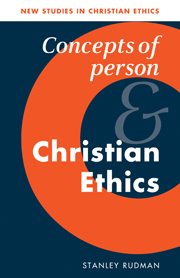Book contents
- Frontmatter
- Contents
- General editor's preface
- Acknowledgements
- List of abbreviations
- Introduction
- PART I ‘PERSON’ IN CONTEMPORARY ETHICS
- PART 2 ‘PERSON’ IN CHRISTIAN PERSPECTIVE
- PART 3 IMPLICATIONS FOR A CHRISTIAN ETHIC
- 11 A communicative ethic: Hauerwas and Habermas
- 12 A community of ethical difference: including the ‘other’
- 13 The logic of superabundance: an ethic of forgiving love
- 14 Rights and persons: the religious ground of human rights
- 15 The integrity and transformation of creation
- Conclusion
- Notes
- Select bibliography
- Index of subjects
- Index of names
11 - A communicative ethic: Hauerwas and Habermas
Published online by Cambridge University Press: 02 December 2009
- Frontmatter
- Contents
- General editor's preface
- Acknowledgements
- List of abbreviations
- Introduction
- PART I ‘PERSON’ IN CONTEMPORARY ETHICS
- PART 2 ‘PERSON’ IN CHRISTIAN PERSPECTIVE
- PART 3 IMPLICATIONS FOR A CHRISTIAN ETHIC
- 11 A communicative ethic: Hauerwas and Habermas
- 12 A community of ethical difference: including the ‘other’
- 13 The logic of superabundance: an ethic of forgiving love
- 14 Rights and persons: the religious ground of human rights
- 15 The integrity and transformation of creation
- Conclusion
- Notes
- Select bibliography
- Index of subjects
- Index of names
Summary
Previous chapters have illustrated how speech, communication, embodiment and relation to others, as well as autonomy, rights and interests have been integral aspects of personhood in more than one period of history. Persons are not solitary individuals, but persons in relation to others. This is also true from a Christian perspective. In examining the implications of personhood for Christian ethics, therefore, it is appropriate to make use of insights drawn from theology and social theory, as well as from philosophical ethics about the nature of ethical discourse. In this and the next chapter, we consider what is involved in developing a communicative Christian ethic and seeing the church as a community of ethical difference.
Despite the secularisation of intellectual disciplines since the Enlightenment and the privatisation of many aspects of religious life, religion and theology still make a strong contribution to public and private values. The religious pluralism of modern societies has made it more difficult to link such values with a single religious tradition, but all the major religions with their several million adherents have a particular interest in the ethical dimension. The interaction of religious and secular interpretations of morality is of critical importance in the modern world.
’Community’ is sometimes contrasted with ‘society’.1 ‘Society’ may refer to a fairly loosely connected set of individuals and groups for whom belonging to the same society means little more than adherence to the same laws.
- Type
- Chapter
- Information
- Concepts of Person and Christian Ethics , pp. 227 - 256Publisher: Cambridge University PressPrint publication year: 1997



